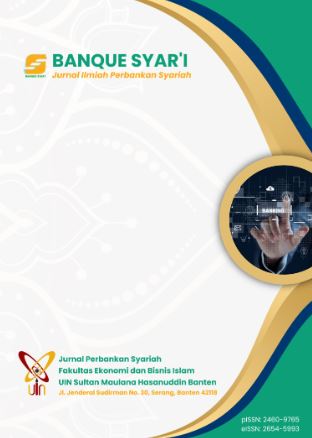Tantangan dan Peluang Perbankan Syariah Dalam Membangun Inovasi Bisnis dan Sustainability di Era Digital
Keywords:
Challenges, Opportunities, Islamic Banking, Innovation, Sustainability, DigitalAbstract
The development of Sharia finance in Indonesia has grown rapidly, presenting both challenges and opportunities for businesses, particularly banking, to expand their operations to create a sustainable economy for society and the environment in the future. This study employs a qualitative method with a literature review approach to explore the opportunities and challenges faced by Islamic banking in fostering innovation and sustainability in the digital era. Data were collected through literature studies. The findings reveal that Islamic banks in the digital era have opportunities to support banking innovation and develop sustainable finance by implementing the ESG (Environmental, Social, and Governance) framework in alignment with Sharia principles. In this context, Islamic banks can enhance existing programs, such as zakat (almsgiving), sadaqah (charitable giving), and waqf (endowment), as part of their social initiatives to strengthen sustainability in banking. The challenges faced by Islamic banking in fostering Sharia innovation include the still underdeveloped information and communication technology (ICT) infrastructure, which can hinder the delivery of Islamic banking services and limit their reach to remote rural areas.
Downloads
References
Alhamuddin, A., Inten, D. N., Mulyani, D., Suganda, A. D., Juhji, J., Prachagool, V., & Nuangchalerm, P. (2023). Multiple intelligence-based differential learning on critical thinking skills of higher education students. International Journal of Advanced and Applied Sciences, 10(8), 132-139.
Ansori, A., Tarihoran, N. A., Mujib, A., Syarifudin, E., & Firdaos, R. (2024, October). Systematic mapping in the topic of Islamic education management and education management based on bibliometric analysis. In AIP Conference Proceedings (Vol. 3098, No. 1). AIP Publishing.
Fitri, F. A., Syarifuddin, E. ., & Sulong, S. . (2024). Analysis of the zakat village model for economic sector utilization: ANP approach. Jurnal Ekonomi & Keuangan Islam, 10(1), 90–102. https://doi.org/10.20885/JEKI.vol10.iss1.art7
Irawan, W., Suwarman, R., Azim, M., Sudrajat, B., & Hamsyiah, N. (2023). RESERVES FOR SHARIA LIFE INSURANCE CONTRIBUTIONS USING THE GROSS PREMIUM VALUATION (GPV) METHOD BASED ON VASICEK MODEL. BAREKENG: Jurnal Ilmu Matematika Dan Terapan, 17(2), 0635-0640. https://doi.org/10.30598/barekengvol17iss2pp0635-0640
Jannah, M., Fahlevi, M., Paulina, J., Nugroho, B. S., Purwanto, A., Subarkah, M. A., & Cahyono, Y. (2020). Effect of ISO 9001, ISO 45001 and ISO 14000 toward financial performance of Indonesian manufacturing. Systematic Reviews in Pharmacy, 11(10), 894-902.
Peristiwo, H. (2021). Role Of Transportation Thein Supporting Sustainable Halal Tourism In Indonesia. IQTISHODUNA: Jurnal Ekonomi Islam, 10(2). https://doi.org/10.36835/iqtishoduna.v10i2.707
Suganda, A., Lestari, W., & Sulthani, D. (2023). Unraveling the Intricate Dynamics of Turkish Immigrants and Muslim Minorities in Germany. Walisongo: Jurnal Penelitian Sosial Keagamaan, 31(2). doi:https://doi.org/10.21580/ws.31.2.19374
Suryanto, T. (2023). Constructing Islamic Law and Islamic Business Ethics for a Sustainable Halal Industry Economy. Manchester Journal of Transnational Islamic Law & Practice, 19(3).
Syarifudin, E., & Anam , K. . (2023). Tourists’ perceptions of the religious tourism quality services: Gap Analysis Approach. Al-Uqud : Journal of Islamic Economics, 7(2), 229–242. https://doi.org/10.26740/aluqud.v7n2.p229-242
Wazin, Maskuroh, N., Peristiwo, H., & Suganda, A. D. (2024). Indonesian Sharia Tourism Towards a Sustainable Halal Industry. In The AI Revolution: Driving Business Innovation and Research: Volume 1 (pp. 901-911). Cham: Springer Nature Switzerland.
Wulandari, S., & Suganda, A. D. (2021). Determining factors of earnings management based on accrual model. Jurnal Akuntansi dan Auditing Indonesia, 45-53.
Putri, S., Risyanto, H., Suganda, A., & Husni, E. (2021). REC Method in Comparison of Soundness Level of Islamic Bank in Indonesia and Malaysia. Economica: Jurnal Ekonomi Islam, 12(2), 313-334. doi:https://doi.org/10.21580/economica.2021.12.2.9371.
Downloads
Published
How to Cite
Issue
Section
License
Copyright (c) 2024 Authors

This work is licensed under a Creative Commons Attribution-NonCommercial-ShareAlike 4.0 International License.










